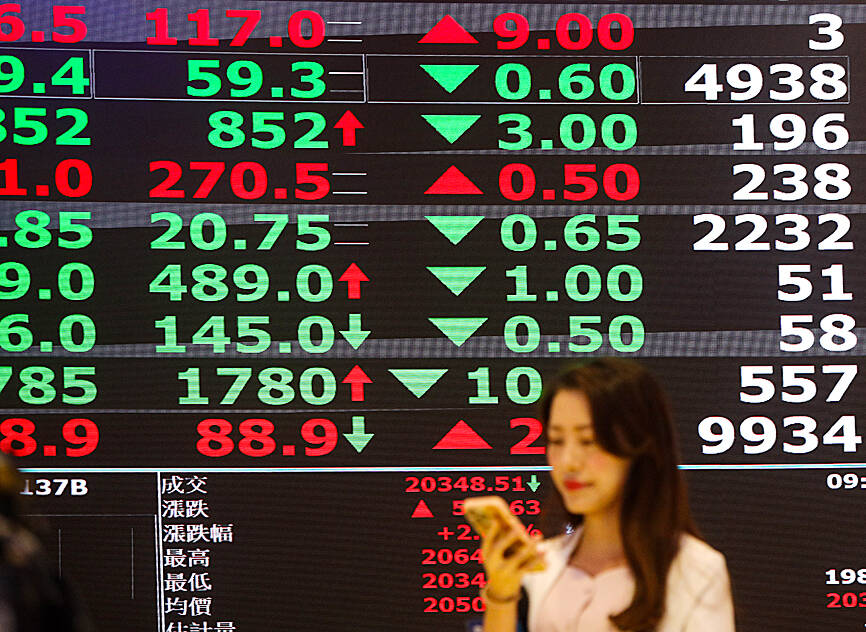Global stocks rose in jittery trading yesterday, as the uncertainty generated by the previous day's aggressive selloff weighed on investor sentiment, even though central bank officials said all the right things to soothe nerves.
The Nikkei 225 index's 10 percent rebound in Tokyo delivered an initial sense of relief after its 12.4 percent drop on Monday — its biggest daily sell-off since the 1987 Black Monday crash.
European markets see-sawed, with the pan-regional STOXX 600 bouncing between a daily loss of 0.4 percent and a gain of 1 percent, while US stock futures remained volatile.

Photo: CNA
Wall Street's main indexes opened higher in volatile trading early yesterday, as investors looked for bargains after a rout in the previous session when major indices fell more than 2.5 percent.
Elsewhere in Asia, Taiwan’s TAIEX closed up 670.14 points, or 3.38 percent, at 20,501.02, led by large cap semiconductor stocks including Taiwan Semiconductor Manufacturing Co (台積電) and MediaTek Inc (聯發科). The index fell 8.35 percent on Monday.
South Korea’s KOSPI Composite Index rose 3.3 percent to 2,522.15. It had careened 8.8 percent lower on Monday.
Hong Kong’s Hang Seng Index gave up early gains to close 0.3 percent lower at 16,647.34. The Shanghai Composite Index, largely bypassed by Monday’s drama, rose 0.2 percent to 2,867.28.
In Australia, the S&P/ASX 200 rose 0.4 percent to 7,680.60 as the central bank kept its main interest rate unchanged, while the SET index in Bangkok gained 0.3 percent.
“If you wake up in the morning to discover that Japan is down 10-12 percent, it’s going to scare the daylights out of the sanest person in the world, so it’s understandable that people take flight,” IG Group PLC chief market strategist Chris Beauchamp said.
“On the flip side, I think people got a bit carried away yesterday and it always seems very dramatic at the time,” he said. “It’s normal to see weakness this time of year. The question is — was that enough to reset markets or is there going to be more?”
US Federal Reserve officials sought to reassure markets with San Francisco Fed President Mary Daly saying it was “extremely important” to prevent the labor market from tipping into a downturn.
She said her mind was open to cutting interest rates as necessary and policy needed to be proactive.
The US dollar fended off a mid-morning bout of selling to rise 0.7 percent against the Japanese yen to ¥145.255, having touched a session low of ¥143.63 earlier. It dropped 1.5 percent on Monday to as deep as ¥141.675.
The US dollar also rose against the safe-haven Swiss franc, up 0.4 percent at SF0.8553, while sterling, which often benefits from investor risk appetite, fell 0.6 percent to US$1.269.
US Treasury yields rose, partly in reaction to a rebound in the US ISM services index to 51.4 for last month, but in line with the shift across other markets yesterday. Benchmark 10-year notes were up 7.5 basis points to yield 3.8578 percent.
“Gauging the bottom of such historic sell-offs is complicated and investors will most likely remain cautious before pouring capital back into equity markets,” Convera Europe SA global macro strategist Boris Kovacevic said in Austria.
“However, the dollar-yen pair has now fallen 12 percent since peaking five weeks ago and is in highly oversold territory. The yen is therefore vulnerable to any upside surprises in US macro data leading investors to reconsider the recession trade. This would help Japanese equities stabilize,” he said.
Additional reporting by CNA and AP

Intel Corp chief executive officer Lip-Bu Tan (陳立武) is expected to meet with Taiwanese suppliers next month in conjunction with the opening of the Computex Taipei trade show, supply chain sources said on Monday. The visit, the first for Tan to Taiwan since assuming his new post last month, would be aimed at enhancing Intel’s ties with suppliers in Taiwan as he attempts to help turn around the struggling US chipmaker, the sources said. Tan is to hold a banquet to celebrate Intel’s 40-year presence in Taiwan before Computex opens on May 20 and invite dozens of Taiwanese suppliers to exchange views

Application-specific integrated circuit designer Faraday Technology Corp (智原) yesterday said that although revenue this quarter would decline 30 percent from last quarter, it retained its full-year forecast of revenue growth of 100 percent. The company attributed the quarterly drop to a slowdown in customers’ production of chips using Faraday’s advanced packaging technology. The company is still confident about its revenue growth this year, given its strong “design-win” — or the projects it won to help customers design their chips, Faraday president Steve Wang (王國雍) told an online earnings conference. “The design-win this year is better than we expected. We believe we will win

Chizuko Kimura has become the first female sushi chef in the world to win a Michelin star, fulfilling a promise she made to her dying husband to continue his legacy. The 54-year-old Japanese chef regained the Michelin star her late husband, Shunei Kimura, won three years ago for their Sushi Shunei restaurant in Paris. For Shunei Kimura, the star was a dream come true. However, the joy was short-lived. He died from cancer just three months later in June 2022. He was 65. The following year, the restaurant in the heart of Montmartre lost its star rating. Chizuko Kimura insisted that the new star is still down

While China’s leaders use their economic and political might to fight US President Donald Trump’s trade war “to the end,” its army of social media soldiers are embarking on a more humorous campaign online. Trump’s tariff blitz has seen Washington and Beijing impose eye-watering duties on imports from the other, fanning a standoff between the economic superpowers that has sparked global recession fears and sent markets into a tailspin. Trump says his policy is a response to years of being “ripped off” by other countries and aims to bring manufacturing to the US, forcing companies to employ US workers. However, China’s online warriors